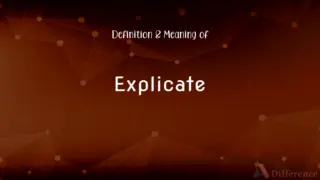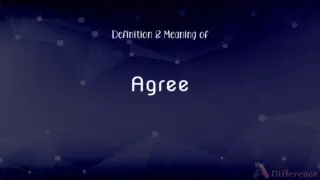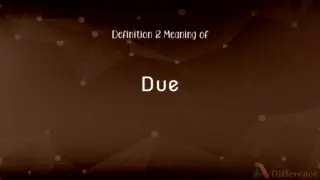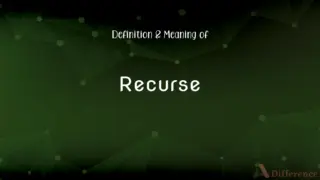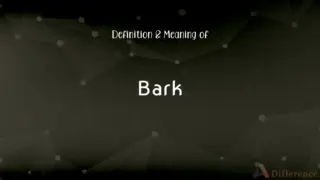Aside Definition and Meaning
By Maham Liaqat & Fiza Rafique — Published on May 12, 2024
Aside is a term used to describe a remark or passage by a character in a play that is intended to be heard by the audience but not by other characters. e.g., In the play, the character whispered an aside, revealing his true intentions.
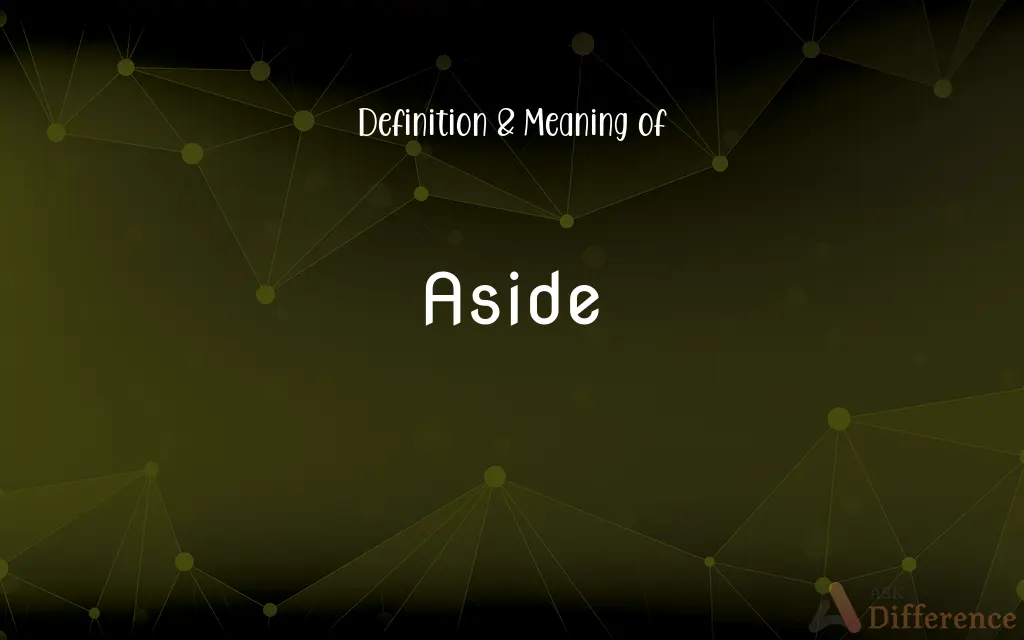
Table of Contents
Aside Definitions
In theater, an aside is a comment made by a character that others on stage are not supposed to hear.
She delivered an aside, commenting on the absurdity of the situation.
As a noun, aside refers to a statement that deviates from the main topic.
Let's put that argument aside and focus on the main issue.
Aside can describe something that is stored for future use.
She put some money aside for emergencies.
Aside can act as an adverb meaning "to one side; out of the way."
He stepped aside to let her pass.
Used figuratively, aside means removing something from consideration.
He set his doubts aside to make a decision.
Aside can express a temporary departure from a main theme or topic.
As an aside, he mentioned that he would be on vacation next week.
In literature, an aside is used to give the audience special information about the other characters or the plot.
The narrator’s aside helped the audience understand the character's motivation.
To or toward the side
Step aside.
Out of one's thoughts or mind
Put my doubts aside.
Apart
A day set aside for relaxing.
In reserve; away
Put a little money aside.
Being excepted or excluded from consideration
All joking aside, can you swim two miles?.
A piece of dialogue intended for the audience and supposedly not heard by the other actors on stage.
A remark made in an undertone so as to be inaudible to others nearby.
A parenthetical departure; a digression.
To or on one side so as to be out of the way.
Move aside, please, so that these people can come through.
Not in perfect symmetry; distorted laterally, especially of the human body.
An incidental remark to a person next to one made discreetly but not in private, audible only to that person.theatre (theatre) A brief comment by a character addressing the audience, unheard by other characters.
A minor related mention, an afterthought.
On, or to, one side; out of a straight line, course, or direction; at a little distance from the rest; out of the way; apart.
Thou shalt set aside that which is full.
But soft! but soft! aside: here comes the king.
The flames were blown aside.
Out of one's thoughts; off; away; as, to put aside gloomy thoughts.
So as to be heard by others; privately.
Then lords and ladies spake aside.
Something spoken aside; as, a remark made by a stageplayer which the other players are not supposed to hear.
A line spoken by an actor to the audience but not intended for others on the stage
A message that departs from the main subject
On or to one side;
Step aside
Stood aside to let him pass
Threw the book aside
Put her sewing aside when he entered
Out of the way (especially away from one's thoughts);
Brush the objections aside
Pushed all doubts away
Not taken into account or excluded from consideration;
These problems apart, the country is doing well
All joking aside, I think you're crazy
In a different direction;
Turn aside
Turn away one's face
Glanced away
Placed or kept separate and distinct as for a purpose;
Had a feeling of being set apart
Quality sets it apart
A day set aside for relaxing
In reserve; not for immediate use;
Started setting aside money to buy a car
Put something by for her old age
Has a nestegg tucked away for a rainy day
In a conversation, an aside is a remark not directly related to the main conversation.
During the meeting, he muttered an aside that made me chuckle.
Aside can mean to place something in a separate position or location.
She laid the book aside and went to answer the door.
Aside also implies a dismissive or marginal treatment of something.
With a wave of his hand, he brushed the objection aside.
Aside Snonyms
Interruption
An act of stopping the continuous progress of an activity or process.
His phone call was an unwelcome interruption.
Excursus
An appendix or digression that discusses a particular point.
The book includes an excursus on historical background.
Diversion
A deviation from a course or standard.
We took a scenic diversion on our way home.
Remark
A short statement or comment.
He made a sharp remark about the weather.
Comment
A verbal or written remark expressing an opinion or reaction.
She added a witty comment during the discussion.
Digression
A temporary departure from the main subject in speech or writing.
He took a brief digression into his childhood memories.
Anecdote
A short amusing or interesting story about a real incident or person.
He told an anecdote about his first day at work.
Appendix
Supplementary material at the end of a book, article, document, or other text.
The legal definitions were found in the appendix.
Detour
A route or journey that deviates from the direct way.
The conversation took a detour into unrelated topics.
Footnote
An additional piece of information printed at the bottom of a page.
She referred to the footnote for further details.
Aside Idioms & Phrases
Brush aside
To dismiss or ignore something, often inconsiderately.
He brushed aside all objections to his plan.
Laid aside
To save or reserve something for future use.
She laid aside some money each month for the trip.
Cast aside
To disregard or dismiss something.
He cast aside his fears and spoke confidently.
Put aside
To save something, especially money or time, for a specific purpose.
He put aside his work to spend time with his kids.
Step aside
To move out of the way or to resign from a position.
The president stepped aside to make way for new leadership.
Tossed aside
To discard or reject something carelessly.
The old toys were tossed aside after the holidays.
Glance aside
To look quickly to one side.
She glanced aside nervously during the interrogation.
Set aside
To reserve something for a particular purpose.
The judge set aside the verdict due to new information.
Shove aside
To push something to one side aggressively.
She shoved aside her doubts and proceeded with the project.
Swept aside
To eliminate or disregard something forcefully.
The new evidence swept aside the previous theories.
Kept aside
To keep something separate from other things.
He kept aside the rare stamps in his collection.
Pushed aside
To treat something as less important or to postpone dealing with it.
She pushed aside her homework to go out with friends.
Thrown aside
To discard or abandon something.
His caution was thrown aside in his excitement.
Look aside
To avert one's gaze, typically to ignore something.
She looked aside when he entered the room.
Move aside
To change position to allow others to pass or to make room for something else.
He moved aside to let the crowd through.
Turn aside
To change direction or avoid facing something.
He turned aside to avoid her gaze.
Kick aside
To reject or dismiss something with contempt.
He kicked aside the old rug as if it were trash.
Flick aside
To dismiss or remove something with a quick movement.
She flicked aside the curtain to let in more light.
Nod aside
To acknowledge someone or something with a tilt of the head to one side.
He nodded aside to his colleague to begin the presentation.
Pulled aside
To move someone or something to a quieter or more private place.
The teacher pulled him aside to discuss his behavior.
Aside Example Sentences
He quietly whispered an aside during the lecture.
She put her toys aside to clean her room.
He glanced aside when he heard his name.
I need to set some money aside for college.
He wrote his worries aside in his journal.
We need to put our differences aside and work together.
They stepped aside to let the ambulance pass.
She pulled her friend aside to share a secret.
Can you move aside so I can see the board?
He brushed aside the curtain to reveal a hidden door.
He swept aside all the papers on his desk to make space.
She tossed her old clothes aside when she cleaned her closet.
She kicked the stone aside as she walked.
Let's set aside some time to talk about this tomorrow.
The child was pushed aside in the crowded hallway.
Common Curiosities
Why is it called aside?
The term "aside" comes from the combination of "a-" (a variant of "on") and "side," referring to words spoken to the side, away from the main action or conversation, especially in theatre.
How many syllables are in aside?
Aside has two syllables.
What is a stressed syllable in aside?
The stressed syllable in "aside" is the second syllable: -side.
How is aside used in a sentence?
Aside is often used to indicate a remark not directly related to the main topic. e.g., He mentioned, as an aside, that he would not be available next week.
How do we divide aside into syllables?
Aside is divided into syllables as: a-side.
What is the verb form of aside?
Aside does not have a verb form; it is primarily used as a noun or adverb.
What is the pronunciation of aside?
Aside is pronounced as /əˈsaɪd/.
What part of speech is aside?
Aside is used as a noun and an adverb.
What is another term for aside?
Another term for "aside" is "digression" when used to refer to a departure from the main subject in speech or writing.
What is the opposite of aside?
The opposite of aside could be considered "mainstream" or "central," referring to the main topic or conversation.
Is aside an abstract noun?
Yes, when used as a noun, aside is abstract as it refers to something intangible, like a remark or concept.
Which determiner is used with aside?
Determiners like "an" or "the" can be used with aside, e.g., "an aside" or "the aside."
What is the root word of aside?
The root word of "aside" is "side," with the prefix "a-" meaning "on" or "to."
Is aside a countable noun?
Yes, aside is a countable noun.
Is the word aside imperative?
No, aside is not imperative; it does not command or request.
What is the singular form of aside?
Aside is always singular; there is no separate singular form.
What is the plural form of aside?
The plural form of aside is asides.
Is aside a noun or adjective?
Aside is used as a noun and an adverb, but not as an adjective.
Is aside an adverb?
Yes, aside can also function as an adverb.
Is aside a collective noun?
No, aside is not a collective noun.
Is the aside term a metaphor?
In its theatrical sense, aside can be considered a metaphor, as it represents a technique where something is said "to the side."
Which article is used with aside?
The indefinite article "an" or the definite article "the" can be used with "aside."
Which vowel is used before aside?
The vowel "a" is used before "side" to form the word "aside."
Which preposition is used with aside?
Common prepositions used with "aside" include "put aside," "step aside," and "set aside."
Which conjunction is used with aside?
Conjunctions are not typically used directly with "aside."
Is aside a negative or positive word?
Aside is neutral; it is neither inherently negative nor positive.
Is aside a vowel or consonant?
The word aside starts with a vowel sound.
Is the word aside a Gerund?
No, aside is not a gerund; it does not have a verb form.
Is the word “aside” a Direct object or an Indirect object?
The word "aside" typically functions neither as a direct object nor an indirect object but as an adverbial modifier or a standalone noun.
Share Your Discovery

Previous Term
Harness Definition and Meaning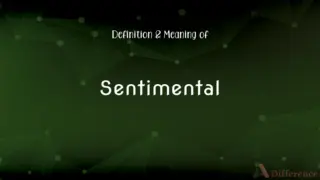
Next Term
Sentimental Definition and MeaningAuthor Spotlight
Written by
Maham LiaqatCo-written by
Fiza RafiqueFiza Rafique is a skilled content writer at AskDifference.com, where she meticulously refines and enhances written pieces. Drawing from her vast editorial expertise, Fiza ensures clarity, accuracy, and precision in every article. Passionate about language, she continually seeks to elevate the quality of content for readers worldwide.














